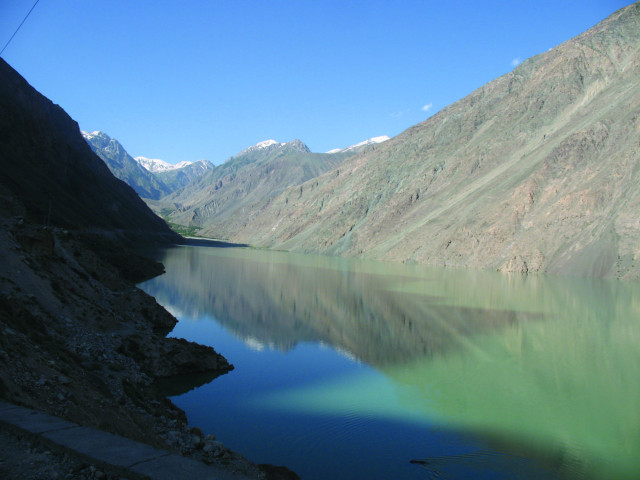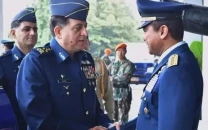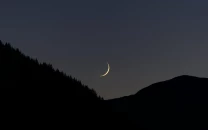Welcome to Baltistan

Welcome to Baltistan
Entering Skardu at dusk, one’s first impression is that it is an army town. A check post registers all outsiders. On finding out that I was travelling alone, the army sentry gave me an incredulous look. Maybe he’d have been happier if I’d been a RAW agent?
But after a gruelling seven-hour journey, if one was looking forward to collapsing in bed, it was a vain hope. From my balcony in the Hotel Mashabrum, I could see the river streaming, ice-capped mountains stared back, stars started to glimmer, and the last of the weary fishermen and fishing enthusiasts trudged back, without any catches. In the distance, I could hear the roar of the river as it made its way through the city.
The next morning, I went to the Deosai Plains, accessible via a dirt road that cuts an uphill route through the mountains. One can see melting glaciers and streams of ice-cold water gushing down the mountain and falling into the valley below. But it’s fairly hard to concentrate on the sights of nature when you have a driver like Nasir, who fed my appetite for the ludicrous with his anecdotes about the Line of Control, which lies nearly six hours away from the town of Skardu.
“When you climb one of the mountains near Kargil, you can see the Indian side of the border. There’s a mountain there that’s been taken over by the Indians, so we call it Kafir’s Peak,” said Nasir.
At my incredulous look, he explained, “Because it’s been taken over by kafirs.”
Aman Ki Asha anyone?
But when one reaches Deosai, all previous sights are forgotten. Blooms of every colour dot the plains and low-hanging clouds seem to kiss the ground, as marmots (a type of squirrel) race around and, on spotting humans, scamper back to their burrows.
On the way from the Deosai plains to the Bara Paani bridge, also affectionately referred to as the jhoola bridge (see image to understand why), is a makeshift WWF camp. The members of the camp kindly offered us a cup of sugary tea and, more to the point, use of their port-a-loo, while explaining their work. Deosai, apart from being one of the most beautiful sights in Pakistan, is also home to 70 bears, according to the last census of their species. “Are you,” I asked, “friends with them?” my imagination going haywire with images of grizzly bears attacking helpless eco-activists.
“Of course, we have names for them too. Big Boy, Shaitaan, and Aunty.”
“Why is the female bear called Aunty?”
“Oh, she gives birth to two children at a time.”
Heading back to Skardu after downing a cup of over-sweetened tea, one comes across the jewel-toned Satpara Lake. But once work on the Satpara Dam is completed, the lake will dry up. At the Satpara Lake Inn, one can see the remainders of a small island and a mosque that were submerged after work on the dam began, a powerful reminder of the battle between energy needs and environmental degradation. There was also a poor buffalo that had got stranded in the water, and as half a dozen onlookers watched, it managed to swim back to shore. That’s Animal Kingdom — 1, Nature — 0.
On the outskirts of Skardu are the ancient Buddha carvings but the first thing one sees is a sign asking, rather than declaring: “It is forbidden to stone the stone statue?” Clearly the administration overseeing this site is still undecided on whether stoning is kosher or not. The carvings themselves have been tampered with and certain portions chiselled out.
The next morning I headed out to the Mantokha waterfall, where ice-cold water from melting glaciers and snow streams down the mountains. At Mantokha, an electricity pole had fallen down in the river, and villagers were busy retrieving and erecting it again. Also on the itinerary was the Shigar Fort, a 17th century fort that has been restored to its former glory, and is currently used as a hotel by the Serena chain. En route to Shigar Fort, one can see villagers working away at the wheat thresher to make flour. More than the actual destinations, it is the route that is fascinating, passing through towns and villages, and terraced farms on mountainsides, one spots people working in the fields, ferrying loads of wheat in baskets strapped to their backs. The route to Shigar cuts through mountains where one can see the barren valley where many centuries ago a river flowed.
For a journalist trying to take a vacation, one of the benefits of Baltistan is that newspapers arrive two to three days late, which makes it easier to disconnect from reality. But on my third day, I was shocked out of my vacation stupor. I was on my way to Khaplu, where a 19th century fort is located; nearby is a 700-year old mosque built almost entirely out of wood and painted in vivid hues. I was admiring the wheat crop in full bloom along the countryside when my thoughts were interrupted by Liaquat, my driver for the day, “Osama was here.”
I yanked off my headphones in annoyance. “Osama who?”
“Bin Laden. He came to the town of Ghawari, a year before 9/11. Lots of people in the village met him. He stayed for about two weeks.”
A minute ago Ghawari was to me one of the many scenic villages that dot the landscape in Skardu Valley. Now, it seemed defiled by the fact that OBL had been here. How he got into a town where one has to cross an army check post and for outsiders, a mandatory registration of their NIC number and the car’s license plate number with the authorities is required is anyone’s guess.
Liaquat, like his friend Nasir, also had a tale or two about the Line of Control. According to him, a few months ago, an Indian truck had an accident, which led to crates of alcohol being overturned into the river. As the cargo floated down the river into Pakistan, Pakistani villagers fished the brandy and sold it for a tidy profit. Just another one of those confidence building measures that we so desperately need between the sniping neighbours.
In the evening, our destination was the Katchura Lake, nearly 45 minutes away from Skardu. The sea-green lake is unblemished, and at sunset, one of the most peaceful places that could be. This excursion was followed by a failed attempt to have dinner at the uber-pricy Shangrila Resort, which also boasts its own private lake and five-star treatment. After forking out a 200 rupee entrance fee (just to have dinner, mind you), one discovered that dinner was still in the process of being prepared. Clearly, as tourist numbers dwindle, Shangrila Resort’s cooks revert to operating on Pakistan Standard Time.
By now starving, on my return I wearily asked the hotel manager, “It’s 9 pm. Is it safe to go out for dinner alone?”
He smiled. “Madam, this is Baltistan.”
Twenty minutes later, I was pouring copious amounts of delicious tomato soup down my throat at the homey Indus Motel. Around me foreigners and their translators played games of cards, some watched news bulletins, and others ate their meals in silence. As visitors skipped through the city, the rest of the valley prepared to go to sleep.
Published in The Express Tribune, August 8th, 2010.


















COMMENTS
Comments are moderated and generally will be posted if they are on-topic and not abusive.
For more information, please see our Comments FAQ